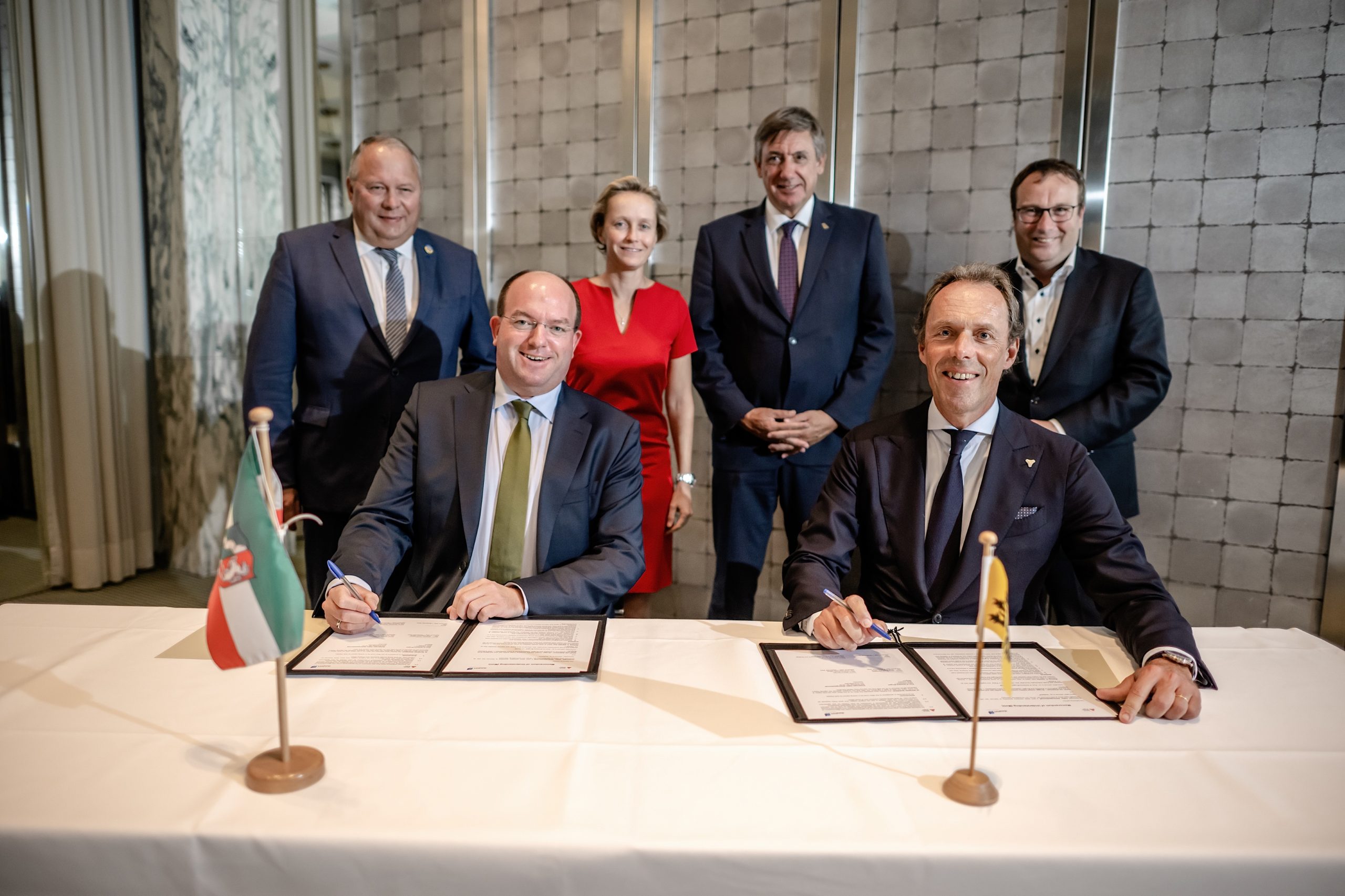From left: Josef Hovenjürgen, Parliamentary State Secretary in the Ministry for Home Affairs, Municipal Affairs, Building and Digitization of the State of North Rhine-Westphalia, duisport CEO Markus Bangen, Deputy Mayor of the City of Antwerp and President of the Board of the Port of Antwerp-Bruges, Annick De Ridder, Flemish Prime Minister Jan Jambon, Jacques Vandermeiren, CEO of the Port of Antwerp-Bruges, and Oliver Krischer, North Rhine-Westphalia's Minister for the Environment, Nature Conservation and Transport. © Andreas Endermann
- Cooperation on energy transition, hinterland connections and infrastructure
- Further step in the expansion of the European Future Network
High-ranking representatives of duisport and Port of Antwerp-Bruges signed a long-term cooperation agreement yesterday. duisport CEO Markus Bangen and Jacques Vandermeiren, CEO of Port of Antwerp-Bruges, sealed the far-reaching partnership in the presence of Flemish Prime Minister Jan Jambon.
North Rhine-Westphalia’s Minister for the Environment, Nature Conservation and Transport, Oliver Krischer, as well as the Deputy Mayor of the City of Antwerp and President of the Board of Port of Antwerp-Bruges, Annick De Ridder, attended the event, as did Josef Hovenjürgen, Parliamentary State Secretary in the Ministry for Home Affairs, Municipal Affairs, Building and Digitization of the State of North Rhine-Westphalia.
At the heart of the agreement is the expansion of cooperation in the areas of energy transition, rail and hinterland connections, and port infrastructure. All three areas are of outstanding importance for the reliable supply of industry and the stabilization of supply chains between Germany and Belgium and within Europe.
Supply chain for hydrogen
The European energy system will increasingly focus on sustainable energy sources, with green hydrogen carriers playing a crucial role. The development of solutions for the import, storage and distribution of green hydrogen in various forms is therefore one of the main strategic pillars of the cooperation between the two ports. The goal is to build an international supply chain for hydrogen in which both partners become central hydrogen hubs for Europe.
To achieve this goal, duisport and Port of Antwerp-Bruges want to establish a high-frequency rail shuttle in addition to planned pipeline connections and establish rail as a “rolling pipeline”. The expansion of the hinterland network, the promotion of sustainable multimodal transport connections, and the steady shift to environmentally friendly modes of transport are substantial for the realization of the energy transition.
As both ports aim for climate neutrality by 2050, the development of environmentally friendly port handling equipment is also part of the joint agreement.
Expansion of the Future Network
For duisport, the cooperation with Port of Antwerp-Bruges is another important step in the expansion of its future network. Similar agreements were already concluded with the ports of Rotterdam and Amsterdam in May and June of this year.
“Our ports have a key role in their regions as leading logistics and industrial centers and are already linked by various multimodal connections. Against the background of the current global challenges, it is only logical that we sustainably strengthen our European partner network and cooperate even more closely,” says duisport CEO Markus Bangen.
Jacques Vandermeiren, CEO of Port of Antwerp-Bruges: “To realize the ambitious plan to become a climate neutral continent, we have to guarantee the European industry reliable and secure access to renewable energy sources. The import, transmission and distribution of green molecules needs short, mid and long term solutions. Developing a robust multimodal supply system will be fundamental to make the change happen. And we are pleased that duisport and Port of Antwerp-Bruges are combining forces to that end.”
ABOUT PORT OF ANTWERP-BRUGES
With a total throughput of 289 million tons per year, Port of Antwerp-Bruges is an important hub for global trade and industry. The port is an important link for the handling of containers, general cargo and the transshipment of vehicles. Port of Antwerp-Bruges is home to 1,400 companies and is home to the largest integrated chemical cluster in Europe. The port provides directly and indirectly for a total of 164,000 jobs and a value added of 21 billion euros.
Port of Antwerp-Bruges has a clear goal: to become the first port in the world to balance economy, people and climate. The port aims not only to continue its growth trajectory, but also to leverage its unique position as a logistics, maritime and industrial platform to lead the transition to a circular and low-carbon economy. Together with the port community, customers and other partners, Port of Antwerp-Bruges is actively seeking innovative solutions for a sustainable future. Responsibility for the environment, and therefore for society, is high on the agenda.
The Antwerp and Zeebrugge port sites are operated by the Antwerp-Bruges Port Authority, a limited liability company with the City of Antwerp and the City of Bruges as shareholders. The port company employs 1,800 people. Antwerp’s deputy mayor Annick De Ridder is chairman of the board and Bruges mayor Dirk De Fauw is vice chairman. Jacques Vandermeiren is CEO and Chairman of the Executive Committee, which is responsible for day-to-day operations.
